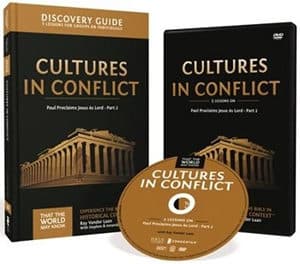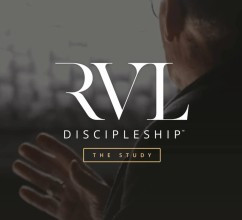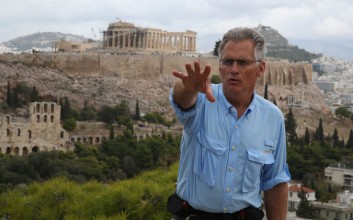John Fuller: How do you live your life as a Christian, and how do you express your faith to others? Well, the scripture gives us some pretty clear guidelines, and Ray Vander Laan is passionate about helping you understand what those are. He’s our guest today on Focus on the Family with Jim Daly, and I’m John Fuller.
Jim Daly: John, may we never lose sight of two main things that Jesus taught us, uh, to love God and to love our neighbors as ourselves. That’s the clearing call of Jesus. It’s really the neon sign of the New Testament. Jesus himself said, “These are the two commandments. If you do these two things, you’ll fulfill the whole law.” And so it’s important for us to come back to it often to remind ourselves of how to do that. And examples in scripture are the best place to start. Paul, in the New Testament set an incredible example for us, and we’ll hear more about him today.
Ray Vander Laan, the host of the, That the World May Know series is a wonderful friend, has been a partner of Focus on the Family for more than 30 years, and, uh, developed this great video series. Today we’re focusing on content from the DVD release, Cultures in Conflict, and there’s no better time to delve into the scripture and to better understand the conflict that Christianity often faces or needs to address in a culture that doesn’t know God. We are living in that moment today.
John: Oh yeah, there are reminders every day about that. And Ray’s gonna help us, uh, have more insight on the topic. He brings historical and cultural context to the scripture, and he’s been a Bible teacher for nearly 50 years and has served as the religion instructor at Holland Christian Schools in Holland, Michigan. Jim, he’s also the host of a brand new video series called RVL Discipleship, Ray Vander Laan Discipleship. And that’s only available through Focus on the Family.
Jim: The series gives you the tools to change how you experience scripture. Jene and I experienced walking in Israel with, uh, Ray. It was an incredible experience. And it will change how you live and interact with your family, friends, and the culture because it gives you so much information that we don’t get, uh, in our churches, unfortunately.
John: Mm-hmm.
Jim: Season three is just coming out, and each of the seasons includes about 10 episodes, roughly 15 minutes each. So it’s very digestible quickly. Uh, they’re great to use in small group study or with your family as part of a family devotional. If you haven’t seen RVL Discipleship yet, uh, be sure to go to our website to see a free preview.
John: And you can access that free preview episode and learn more about RVL Discipleship at focusonthefamily.com/broadcast. Now, let’s go ahead and get into today’s conversation on Focus on the Family with Jim Daly. It’s based on content from Ray’s series, That the World May Know Set 16, which Jim mentioned, and, uh, that was filmed on location in Greece. Now, in the discussion, Jim started by asking Ray about the Apostle Paul, who wrote so much of the New Testament and was a Jewish scholar.
Jim: Paul had the incredible opportunity to engage with the philosophers of the day. Um, there in Athens, I think was his goal. I, I’m assuming that was the reason he probably saw Athens as a, a main place to go and preach the gospel ’cause he could reach so many. Um, w- what do we need to understand about that culture at that time?
Ray Vander Laan: It’s interesting if you put the Athens part of Paul’s teaching journey, if you want to call it that, into context. “He walked into the city,” Luke writes in the book of Acts, “And saw temples and idols everywhere. And it troubled him greatly.” Luke says, now the question is, why would those idols trouble him? Well, obviously the Bible says that worshipping an idol god is sinful. But I think it’s deeper than that. Judaism resented and resisted idolatry primarily because it took honor and credit and glory that belonged to God alone.
Jim: Hmm.
Ray: Zeus doesn’t bring us the rain and the fertility and prosperity. Mars doesn’t defeat our enemies. They understood that there is only one God. So if you worship idols, then in effect you’re giving credit to someone other than the God, the creator of the universe.
Jim: Mm-hmm.
Ray: So he did a Jewish thing. He’s so upset. He went to the synagogue and began to reason with them it says. We don’t know what he said, but I think it was more than just, “Jesus has come and He’s our promised Messiah.” I think he’s saying to them, “Why aren’t you Jews living in such a way that people discover who the real God is? Why aren’t you witnessing?” And that helps to place the context both of Paul. And what we tried to do in this, um, Set 16, which looks at the clash of cultures. Israel had been chosen by God as a very weak people, slaves no less, and asked to live in such a way that they would put God on display to the whole world.
Jim: Hmm.
Ray: He said, “Make my name known. Be a witness to the nations. Let your light shine. Be a kingdom of priests.” A priest is someone who puts the God he serves on display. So Israel was called to live in such a way, not that, not simply where they’re telling the world who God was, but they were showing the world what He was like by their lives. Now, they didn’t always do that so well. My favorite story is the Book of Ruth, where a family lived such a godly life that this pagan woman was willing to renounce her own faith, her own people, her own land, just to become part of Israel, Israel’s God and Israel’s people. So Paul, I think, went to the Jews in Athens and said, “Why aren’t you guys living in such a way that others are discovering what the true God is like?” Out of that, he went to the agora, to the, to the, uh, forum, if you will. The Roman word would be forum and began to reason with the philosophers.
Now, I think your point now is a good one. Paul saw an opportunity to bring God’s truth to bear on the most brilliant and best expression of philosophical truth that the Roman Empire had to offer. Um, Athens was no longer the head of a great empire like it had been under Alexander the Great, but Athens was still known as the intellectual center of the Roman Empire.
Jim: Hmm.
Ray: And so in a sense, he went to the Harvard and Yale to the Oxford of his world and took the opportunity to engage their understanding of truth with his understanding of the truth God had revealed in scripture.
Jim: Mm-hmm. And it’s so powerful to think of in, in that context. Um, and you’ve mentioned some of that experience Paul had, but talk about going to Mars Hill, uh, that delivery of what he was doing, recognizing the unknown God. I love the craft in which Paul-
Ray: Mm-hmm.
Jim: … looked at the culture around him, and this is what you talk about in Set 16, how he seized on this-
Ray: Mm-hmm.
Jim: … idol that they had, this god that they worshipped, to the unknown God. What did he do with that?
Ray: As he reasoned with the philosophers and would share reason in Hebrew as a very specific practice, it means to present a point of view and then to show the scriptural basis of that point of view. He happened to talk about the resurrection. Now that raised their eyebrows big time.
Jim: Mm-hmm.
Ray: Because in the Greek world, it was clear to them, to every philosophical school, there is no bodily resurrection. So they said to Paul, “We think you’re presenting new beliefs, new ideas. We have a council called the Areopagus.” Now, the history of the Areopagus was, it was more or less the Supreme Court of the Greek empire. It had been founded 700 years before this time. Its mission was to rule on significant cultural and legal issues, but mainly to determine which gods and which beliefs about the gods were permissible.
But imagine if you or I, if any one of us, uh, proclaimed our faith so, um, intensely and so clearly that we got a phone call that said, “Will you come to the Supreme Court? The nine justices on the Supreme Court would like to listen to your point of view.” This was a big deal. So Paul went. Now what we did in our, uh, videos, in this DVD was to take a look at Paul’s presentation to the Areopagus. He does two absolutely brilliant, and I would add, I think Jewish things. One, he first found a half a dozen touchpoint in the culture.
Jim: Mm-hmm.
Ray: He had learned Greek culture so well either in his upbringing or in the past years of his life, or maybe even the time he was in Athens that he had come to know these people. So he starts with an altar he claims to have seen, which was an altar to an unknown god. Now, we’re not quite sure exactly what that was. They have not found one in Athens. There is one that’s been found in Pergamum. Some think the unknown god was a way to describe the Jewish God, because to Gentiles, the Jewish God is unknown. You can’t say his name and you don’t make statues of him. So he’s unknown. I’m not so sure. Others think unknown meant maybe there’s a god we haven’t even discovered yet. He’s all this-”
Jim: Kinda the catch-all. (laughs)
Ray: Yeah. Sort of the catch-all. Yeah.
John: We’re- We’re gonna cover it.
Ray: Others said no, have said no. The idea was, “When something happens and we’re not sure which god is doing it either bad or good, let’s worship at this altar because the god who caused the plague or the god who defeated our enemy isn’t known. So we don’t know which god to sacrifice to. Let’s sacrifice to the unknown god.” But Paul picks up on that altar and says to them very brilliantly, “I’m gonna tell you about the God you’re ignorant of.” So he had a point a, a touch point in the culture. One of the things that troubles me sometimes in my own, um, place in the Christian community is we’re a bit hesitant to really get to know the culture well around us. I run into people every once in a while who will say, “I don’t read anything I don’t agree with, or I don’t watch anything I don’t agree with.”
Jim: Some listening may say, “What’s what I do.”
Ray: Well, and I realize there’s a time and place to be avoiding what’s sinful and what’s, uh, temptation. But I think we need to know our culture really well. We need to know our culture so well, that we know how to speak God’s truth in their language.
Jim: It has to have that purpose though.
Ray: It has to have that purpose. We have to engage them not simply to criticize, not simply to put them down or to judge them, that we stand strongly on what we believe, but to know our culture so well, that we know how to address them, what concepts they need to understand that we believe, or we hold dear. And if we don’t know our culture, we end up just shouting at the wind, in my opinion.
Jim: Yeah.
Ray: He does some other things. He mentions, um, a quotation from one of their philosophers, um, where he talks in, in his speech. In fact, there are probably three he talks about, “In him we live and move and have our being,” which may have come from one of their philosophers. He talks about how we are God’s offspring. And he says, “One of your poets even says this.” So he’s quoting not from biblical sources, but from their own philosophical heroes in their ancient past. So Paul directed his message in a culturally relevant way and addressed the issues that they were dealing with. But there’s another side to it. What we found fascinating as we took a look at that speech is there are at least nine examples where Paul addresses their cultural ideas, but uses words and phrases from scripture.
Jim: Hmm.
Ray: And Paul says, using words that are found in the Bible twice, Paul says, “I’m gonna tell you about this unknown god who doesn’t live in temples made with hands.”
Jim: Mm-hmm.
Ray: That I think is the biggest lesson that God has taught me from the whole story in Athens, is this idea that I need to address my culture by my words and my life, but I need to address the culture first of all in their ideas and categories. I need to speak a language that they understand. But what I need to do that Paul did so brilliantly, is to take biblical phrases, biblical text, biblical ideas, and speak those in the metaphors of the culture I’m addressing.
John: Well, that’s Ray Vander Laan on Focus on the Family with Jim Daly. He is so gifted as a Bible teacher relating truth to where we’re at today. And, uh, that is really the brilliance of the video series, That the World May Know. And, uh, this content really comes from the DVD Set 16, which is called Cultures in Conflict. And we’ve got that here at focusonthefamily.com/broadcast. Uh, call, we’ll tell you more, 800, the letter A and the word FAMILY. 800, the letter A and the word FAMILY. Let me encourage you to get the DVD so you can hear, uh, more passion and inspiration from Ray. And, uh, let’s go ahead and continue now the conversation with Ray Vander Laan and Jim Daly.
Jim: Ray, uh, I’m sitting, I’m just bubbling up because I can remember being with you and how you help people see scripture, feel scripture, live scripture. And so often when we hear the stories, even now, okay, these are things that happened to a man who believed in Jesus 2,000 years ago. How do we apply it today? I mean, when we see Paul working in Athens, uh, picking parts of the culture to elaborate on how God is speaking through that, how do we apply that today? I mean, the believers today, when we see our Supreme Court and decisions they’re making, and we see our state governments and federal governments-
Ray: Mm-hmm.
Jim: … doing things that are so contrary to the word of God, how do we take the scripture and make it apply to today’s world?
Ray: Great question. If RVL, me, if I give my opinion, God may bless that. But if I give God’s Word-
Jim: Hmm.
Ray: … He says, “It will always do exactly what I want it to, and no one can stop it.” So I always say to my students, “Be sure when you’re speaking that your language is salted with biblical phrases, ideas, and even quotations. Because once you turn that loose, it is unstoppable if God wants it to be.” But if you come to the end of the story, note two things. There is not in my New Testament, a first and second Athens.
Jim: Hmm.
Ray: It does not appear a church formed. It does mention one of the members of the Areopagus became a believer. A woman named Damaris became a believer and a few others, but there’s no church. And the second thing, if you move on, and it’s in Set 16 as well, Paul goes next to Corinth alone. And he came to Corinth, he says, in the first chapter of his email to the Corinthians, we call it First Corinthians. Paul says, “I came in weakness and fear and trembling, and not with human wisdom.”
I have a theory. I think for all the brilliance of his speech, Paul realized that that is not the first and foremost tactic God gives His people. God chose His people, first of all, not to tell the world who He was, but to show the world who He was. Jesus came to say, “Let me show you what it looks like if you live out your faith, be my disciple.” And then he sent out his community to be light, to be living witnesses, to hallow his name and to be priests, to put him on display. From Athens where no church forms, Paul goes to Corinth, picks the weak in Corinth, the nobodies. He says, “Not many of you were wise. Not many of you were rich. Not many of you were well known. I picked the nobodies.” And as a house church formed, Corinth became a Christian center. And it wasn’t simply because they were telling others about Jesus, but they were showing what Jesus looked like. And I think that’s the touchpoint that you’ve asked about.
I think what God has called us to do is not simply to tell our culture about God and about Jesus and about faith. I think that’s important. Don’t get me wrong. I think God wants us to be a living witness. And that’s where I wonder sometimes if our shouting at people or being judgmental or maybe even worse in not being successful in living out our own faith. If our marriages aren’t living examples of what marriage looks like, how can we possibly have a message to give to our culture about what marriage is?
Jim: Mm-hmm.
Ray: If our businesses aren’t run with integrity and with compassion and charity, how could we possibly bear witness to a broken world of what business ought to look like?
Jim: Mm-hmm.
Ray: And I think Paul learned a lesson and came to Corinth and said, “There’s a place for brilliant speeches, for philosophical presentation of our faith. I’m gonna go to Corinth and start a church.” And it changed Corinth.
Jim: And I love what you’re saying, uh, Ray, because I think this is the crux of the matter. I think this is where in modernity we may have lost that willingness because it takes effort to live like Christ.
Ray: Mm-hmm.
Jim: I mean, it takes incredible effort.
Ray: Mm-hmm.
Jim: You have to suppress your flesh when you want to react in a mean-spirited way, which comes so naturally.
Ray: Mm-hmm. Mm-hmm.
Jim: I mean, it does to me. I mean, somebody cuts me off. I say this when I speak all the time. I mean, that’s where the Lord has really had (laughs) to work on me.
Ray: Amen.
Jim: Somebody cutting me off on the highway and not going by the rules.
Ray: Mm-hmm.
Jim: And I think we as believers, we tend to want an environment where everybody follows the rules-
Ray: Mm-hmm.
Jim: … and we can all get along.
Ray: Mm-hmm.
Jim: And when people don’t, it really irritates us, whether it’s political or driving down the highway or the neighbor that won’t get off your back for some reason. And if we really press ourselves, we’ve got to respond differently-
Ray: Mm-hmm.
Jim: … because we’re children of God.
Ray: And, and that takes us immediately then to the Corinth study. There are three studies in the piece about, of Corinth. The first looks at how Paul chose, or God chose, if you will, who would listen. Paul chose the weak. He chose the unimportant. So they didn’t have any power. And I find sometimes it’s tempting to think if we could just have the political power, if we could have the economic power as God’s people, we could transform our world. Well, we certainly wanna influence politics. We certainly wanna be involved in economics and, and politics as well. But how often in the Bible did God use weakness to accomplish his purpose?
In fact, if you look at church history, I think it’s more common that the church did well when it was weak by human standards than when it was powerful. So Paul went to Corinth, chose these unimportant people, and God used that weakness to accomplish an amazing thing in Corinth. Paul came to Corinth alone. He came after Athens where apparently no church was started. He came, he said, “I came in fear and trembling. I didn’t come with wisdom. I came in weakness.” He was discouraged. But when he got there, God stepped up.
Jim: Mm-hmm.
Ray: He showed up and the first people he met were a couple named Aquila and Priscilla. They happened to be Jewish and tent makers, the same trade he was, but to his amazement, I’ll bet, they were believers in Jesus already before they got there.
Jim: Hmm.
Ray: So Paul thought, “I’m going alone to this…” I don’t even wanna mention (laughs), a modern equivalent. This was by far believed to be the most decadent city in the world.
John: Mm-hmm.
Jim: Yeah. Perhaps Las Vegas times a hundred.
Ray: Well, okay. You said it. I didn’t.
Jim: I said it.
John: Very pagan.
Ray: (laughs) You’ll get the emails.
John: Yeah.
Jim: Yeah. (laughs).
Ray: What happens in Corinth stays in Corinth kind of thing. It had been founded by, refounded as a colony by Julius Caesar. He populated it with slaves and freed slaves. It was a, a sailor’s center. It had the temple of Aphrodite, the goddess of sex and fertility. Um, at one point in history, one of the writers says there was a temple on the Acropolis with a thousand prostitutes attached to it. Corinthian was to be immoral. And in fact, the word Corinthian shows up for sexually transmitted diseases and for sexual excesses. It also was to be intoxicated. It was a wine production. It was absolutely the most decadent place. How Paul possibly thought he could make a difference in Corinth, I will never know. And he came with nothing. And lo and behold, the first people he meets, have the trade he knows, have a place to conduct his trade so he could work with them, and better have a small house where that first community of believers could meet.
Jim: Hmm.
Ray: And then one night God appeared to him, and he gave him Elijah moment. And God said, “Paul, don’t be afraid.”
Jim: Mm-hmm.
Ray: “Give it everything you got. I have a lot of people in this city-”
Jim: Mm-hmm.
Ray: “… that are going to come to me.” So Paul went from being weak to becoming strong. One of my favorite, um, Jewish writers talks about how God so often uses human weakness and weakness becomes strength when we realize we’re weak. When Abraham and Sarah realized they were not gonna have children on their own, that’s when they became strong.
Jim: Yeah.
Ray: When Moses realized he couldn’t speak because he had a speech impediment, that’s when he became strong because he leaned on God. When Israel stood on the shore of the Red Sea and realized they couldn’t swim, but they just started walking toward the, at that moment, they realized their weakness and they became strong. That’s what happened to Paul. When he realized he was weak. It was not gonna be his brilliance. It was not gonna be his own human talents. It was gonna be the power of God in him. The book of Hebrews says, this whole list of nobodies in that great hero of faith chapter, “Their weakness was turned to strength.”
Jim: Yeah.
Ray: And I like to think in our world, if we’re willing to be sacrificial, people who live in weakness, serving others, God turns our weakness into strength.
Jim: Mm-hmm. There is so much there, Ray, that you’re talking about. I mean, that idea of humility, that God draws you toward humility. He wants you to be humble so He can use you.
Ray: Amen.
Jim: But in this culture today, especially the Christian culture, and we’re at the end of our time, so I’m gonna put this softball up for you so you-
Ray: (laughs).
Jim: … can whack it. But that’s the thing. We have to fight that, that we need to win, that we need to be on top that it’s a zero-sum game.
Ray: Mm-hmm.
Jim: I don’t see that with Paul. I don’t see that in the New Testament at all. And it’s contrary to our nature as humans to go toward weakness. It’s not what our flesh wants to do. We want to conquer.
Ray: Mm-hmm.
Jim: We wanna be on top. We want the power.
Ray: Mm-hmm.
Jim: And like you pointed out, the irony is if you go all the way back to Constantine and, uh, early influence of Christianity and power, we’re still flawed human beings saved by grace-
Ray: Amen.
Jim: … when we get power, we can misuse it.
Ray: Absolutely.
Jim: It’s not necessarily the answer. But the final point here is how do we not be tempted in that power? A- and I mean it in this way, Ray, when you look at the culture today, we have court cases going against religious liberty. We have so much fighting against marriage. How do we settle our hearts and say, “Lord, you’ve put us here in this moment, in this culture, western culture,” our Canadian listeners are part of it too. “How do we settle our hearts and say, what is it you want us to do for you?”
Ray: That’s an amazing question and, and a very biblical question. The answers obviously are varied and involved, but I think there are a couple of points I would make strongly from the life of Paul or the New Testament, let’s say it that way. First, if we take Jesus as the example, this son of God, human who could have called legions of angels-
Jim: Yeah.
Ray: … who stilled storms and raised the dead, change the world by offering His life in sacrifice and service to anyone who believes in Him. That’s how God changed Corinth through Paul is people who were weak, lived sacrificially. The other thing, and that gets us into the last two units, if you will, in Set 16, Paul has two major themes in the book of Corinthians, which he is addressing to the church. One is, “If we’re going to be this living witness, we absolutely have to be in unity. There cannot be any dissension or division among you.” And I’d love to get into that.
Jim: Yeah (laughs).
Ray: The second he addresses the issue of marriage and sexuality through the whole book, because he understands in that decadent city, if we aren’t a living testimony of an alternative to that pagan, Greco-Roman culture, we have no message. We have no power. The power is, “We have a living example of what it looks like if you live our way. And so any, anything that slightly compromises our testimony as godly holy people destroys our power, which is the power to serve others by how we live.” And right in the middle of it, I’ll just throw a little, I’ll throw you a softball right in the middle of it-
Jim: (laughs).
Ray: … he’s got a two chapter discussion of meat sacrifice to idols. Now what does that have to do with sexuality and sexual immorality and marriage? Oh, you have stay tuned.
John: (laughs).
Jim: Yeah. Let’s, in fact, maybe we could take that discussion online.
John: Yeah.
Jim: I have more questions for you, RVL, but I want to do that. And if you want to hear this dialogue come online and John, you’ll give the details.
John: Stop by our website to hear more of the conversation with Ray Vander Laan. Uh, while you’re there, be sure to order your copy of, That the World May Know, uh, the DVD Set 16 includes a discovery guide. And it really is a great tool for you to dig into the scripture for the cultural context and to really better understand how you can apply some of the truth lessons you’ve heard today. Look for, That the World May Know when you’re at our website. That’s focusonthefamily.com/broadcast. Of course, you can always call if you have questions or you prefer to donate and make your order over the phone. Or number is 800 the letter A and the word FAMILY, 800-232-6459. On behalf of our entire team, thanks for listening to Focus on the Family with Jim Daly. I’m John Fuller, inviting you back as we once again help you and your family thrive in Christ.





















